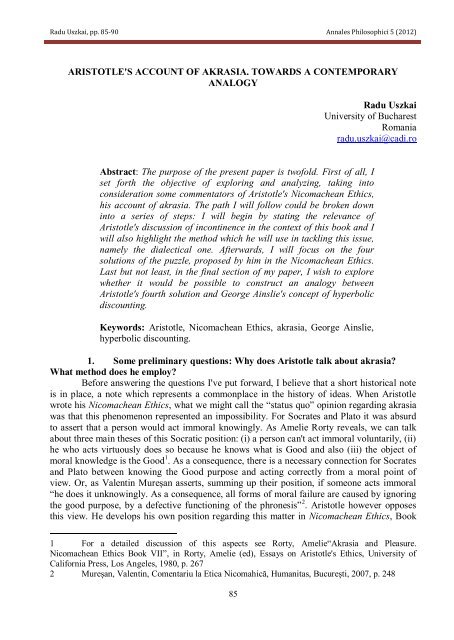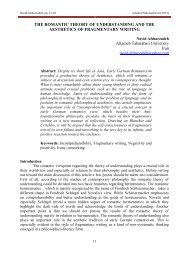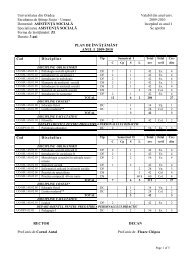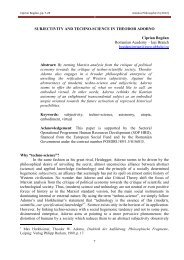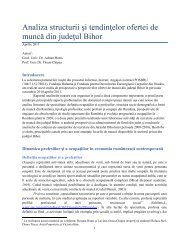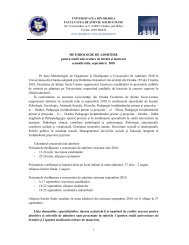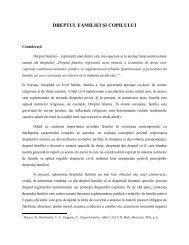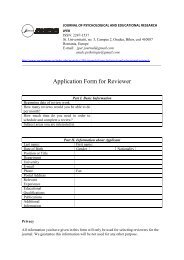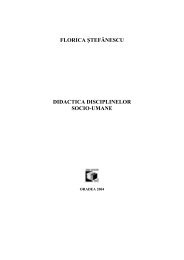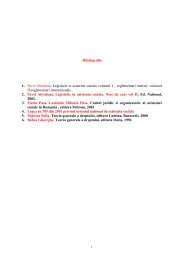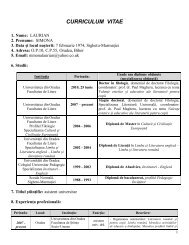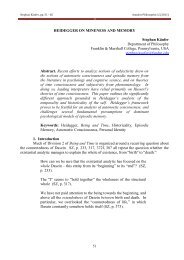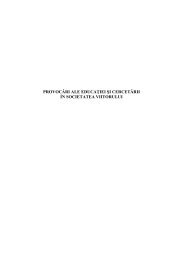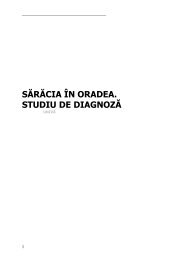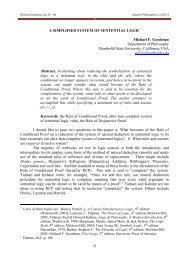ARISTOTLE'S ACCOUNT OF AKRASIA. TOWARDS A ...
ARISTOTLE'S ACCOUNT OF AKRASIA. TOWARDS A ...
ARISTOTLE'S ACCOUNT OF AKRASIA. TOWARDS A ...
Create successful ePaper yourself
Turn your PDF publications into a flip-book with our unique Google optimized e-Paper software.
Radu Uszkai, pp. 85-90 Annales Philosophici 5 (2012)<br />
<strong>ARISTOTLE'S</strong> <strong>ACCOUNT</strong> <strong>OF</strong> <strong>AKRASIA</strong>. <strong>TOWARDS</strong> A CONTEMPORARY<br />
ANALOGY<br />
85<br />
Radu Uszkai<br />
University of Bucharest<br />
Romania<br />
radu.uszkai@cadi.ro<br />
Abstract: The purpose of the present paper is twofold. First of all, I<br />
set forth the objective of exploring and analyzing, taking into<br />
consideration some commentators of Aristotle's Nicomachean Ethics,<br />
his account of akrasia. The path I will follow could be broken down<br />
into a series of steps: I will begin by stating the relevance of<br />
Aristotle's discussion of incontinence in the context of this book and I<br />
will also highlight the method which he will use in tackling this issue,<br />
namely the dialectical one. Afterwards, I will focus on the four<br />
solutions of the puzzle, proposed by him in the Nicomachean Ethics.<br />
Last but not least, in the final section of my paper, I wish to explore<br />
whether it would be possible to construct an analogy between<br />
Aristotle's fourth solution and George Ainslie's concept of hyperbolic<br />
discounting.<br />
Keywords: Aristotle, Nicomachean Ethics, akrasia, George Ainslie,<br />
hyperbolic discounting.<br />
1. Some preliminary questions: Why does Aristotle talk about akrasia?<br />
What method does he employ?<br />
Before answering the questions I've put forward, I believe that a short historical note<br />
is in place, a note which represents a commonplace in the history of ideas. When Aristotle<br />
wrote his Nicomachean Ethics, what we might call the “status quo” opinion regarding akrasia<br />
was that this phenomenon represented an impossibility. For Socrates and Plato it was absurd<br />
to assert that a person would act immoral knowingly. As Amelie Rorty reveals, we can talk<br />
about three main theses of this Socratic position: (i) a person can't act immoral voluntarily, (ii)<br />
he who acts virtuously does so because he knows what is Good and also (iii) the object of<br />
moral knowledge is the Good 1 . As a consequence, there is a necessary connection for Socrates<br />
and Plato between knowing the Good purpose and acting correctly from a moral point of<br />
view. Or, as Valentin Mureșan asserts, summing up their position, if someone acts immoral<br />
“he does it unknowingly. As a consequence, all forms of moral failure are caused by ignoring<br />
the good purpose, by a defective functioning of the phronesis” 2 . Aristotle however opposes<br />
this view. He develops his own position regarding this matter in Nicomachean Ethics, Book<br />
1 For a detailed discussion of this aspects see Rorty, Amelie“Akrasia and Pleasure.<br />
Nicomachean Ethics Book VII”, in Rorty, Amelie (ed), Essays on Aristotle's Ethics, University of<br />
California Press, Los Angeles, 1980, p. 267<br />
2 Mureșan, Valentin, Comentariu la Etica Nicomahică, Humanitas, București, 2007, p. 248
Annales Philosophici 5 (2012) Radu Uszkai, pp. 85-90<br />
VII 3 , with a discussion of other hexis which are neither vice nor virtue: incontinence and<br />
brutishness.<br />
First and foremost however, why is he interested in this topic? For example, Valentin<br />
Mureșan considers that Aristotle's discussion regarding akrasia is not at all accidental. As he<br />
points out, the exploration of the theme of incontinence represents a follow-up of his analysis<br />
from his previous book, On the Soul (De anima). Back then, Aristotle's purpose was that of<br />
inquiring about the particular purpose of the rational part of the soul in relation with virtue.<br />
His goal was that of highlighting the importance of phronesis in choosing the correct goal.<br />
Amelie Rorty confirms this conjecture: "Once Aristotle has tied virtue to phronesis, he must<br />
face the question of whether he is committed to a version of the Socratic position: the<br />
wrongdoing involves a failure of practical wisdom (phronesis) that essentially involves<br />
ignorance of what is good" 4 . Gerald Hughes accepts this interpretation, but introduces the<br />
concept of moral training. According to him, Aristotle wants to resolve the puzzle which was<br />
set forward by Plato and Socrates, because it has something to do with his concept of training<br />
to be virtuous: "after all, his account of moral training is much less narrowly intelectualist<br />
than that offered by Socrates. If we need to train our emotions before we can rely on our<br />
moral judgments ( since practical wisdom and moral virtue depend upon each other), then a<br />
lack of good moral training would lead to our being unable to form correct moral judgments" 5 .<br />
What about the second question though, regarding what method does Aristotle<br />
employ? Quite similar to the discussion from the previous paragraph, critics concur that in the<br />
Nicomachean Ethics’ book dedicated to incontinence we have the clearest example of the use<br />
of the method which he says from the beginning that he will employ, namely the dialectical<br />
one. In his own words, "We must, as in all cases, set the apparent facts before us, and, after<br />
discussing the difficulties, go on to prove, if possible, the truth of all the common opinions<br />
about this affections of the mind, or, failing this, of the greater number and the most<br />
authoritative; for if we both resolve the difficulties and leave the common opinions<br />
undisturbed, we shall have proved the case sufficiently"(1145b, 3-8). After answering these<br />
questions, let us proceed to a more thorough analysis of Aristotle's perspective on<br />
incontinence and the four solutions he advances.<br />
2. Aristotle's account of akrasia<br />
In the previous section I’ve carried forth the idea that Aristotle employs the dialectical<br />
method in his exploration of akrasia. A useful manner to frame the consequences of this<br />
approach is advanced by Valentin Mureșan, which highlights the fact that Aristotle wishes to<br />
solve the following paradox (aporia) between two thesis:<br />
(a) the Socratic denial of the possibility of akrasia (1145b, 25-30);<br />
(b) incontinent actions are an empirical observable fact (1145b, 28).<br />
So, Aristotle appears to say the following: even though Socrates might make a lot of<br />
sense, "to say nobody knowingly does wrong goes against what seems to be the most obvious<br />
facts of our experience" 6 . In order to attain his goal, he will try to make the two thesis<br />
compatible in a coherent manner, changing the Socratic thesis just enough so it could be<br />
3 From this point onward I will be using David Ross's translation of Nicomachean Ethics,<br />
Oxford University Press, Oxford, 2009<br />
4 Rorty, 267<br />
5 Hughes, Gerald J. , Aristotle on Ethics, Routledge, London, 2001, p.147<br />
6 Ibid., p. 149<br />
86
Radu Uszkai, pp. 85-90 Annales Philosophici 5 (2012)<br />
compatible with the factual observation of the existence of akratic actions. As a consequence,<br />
Aristotle will try to show just how it would be possible that "someone who does wrong be said<br />
to know what they are doing?" 7 , and he will develop it in four different solution to the puzzle,<br />
in four different instances of akratic action. 8<br />
The first solution can be found at 1146b, 31-36. It exploits the distinction between<br />
possessing knowledge and making use of it and possessing that knowledge and not make use<br />
of it. In other words, he considers that at least in some contexts it is possible to do wrong<br />
while not bearing in mind certain knowledge. For example, the incontinent consumer of<br />
alcohol does know the negative effects of alcohol consumption but, due to a certain type of<br />
desire he does not make use of that knowledge so he decides to consume alcohol in excess.<br />
The second solution resembles in a way with the first: the distinction which was<br />
presented in the earlier paragraph is introduced in the context of the practical syllogism. In<br />
Aristotle's words, "since there are two types of premises, there is nothing to prevent a man<br />
having both premises and acting against his knowledge, provided that he is using only the<br />
universal premise and not the particular"(1146a, 1-3). The practical syllogism has the<br />
following form:<br />
a) Universal premise (major) : All products which contain tobacco are to be avoided.<br />
b) Particular premise (minor) : This contains tobacco.<br />
c) Conclusion: It is necessary that I should abstain from consuming that product.<br />
In this context, what Aristotle wishes to assert is that, if a person does not reach that<br />
conclusion if he has the knowledge regarding the universal premise, than he does not make<br />
use of the minor premise. However, this still represents a case of knowing and not knowing in<br />
the same time, just like in the first solution.<br />
In 1147a, 10-24, Hughes and Valentin Muresan identify the third explanations for<br />
moral failure in the case of incontinent individuals. In this passage, Aristotle discusses other<br />
types of situations in which someone might know and do not know at the same time. In his<br />
own words, "for within the case of having knowledge and not using it we see a difference of<br />
state, admitting the possibility of having knowledge in a sense and yet not having it, as in the<br />
instance of a man asleep, mad or drunk"(1147a, 11-15). As a consequence, as Valentin<br />
Muresan observes, he is forced to introduce the distinction between a real possession of<br />
knowledge and an apparent one, similar in a way with how an actor interprets a role.<br />
In my opinion, the fourth solution put forward by Aristotle represents the most<br />
interesting one, because it shifts towards a psychological explanation for the akratic behavior.<br />
Some further remarks are, however, needed. Interestingly enough, as Alferd R. Mele observes,<br />
“if, as Aristotle claims, the occurrence of an akratic action implies the presence of a<br />
deficiency in the agent's epistemic relation to a particular premise – let us call this a 'Pdeficiency'<br />
– then(by contra position) the absence of this deficiency implies the non<br />
occurrence of akratic action. Therefore, if the Aristotelian claim in question is correct, there is<br />
7 Ibid., p. 150<br />
8 Hughes reveals however that this is not the only interpretation oh Aristotle's account. For<br />
example, he criticizes Gossling view (in Hughes, p.154) who considers that we don't have four different<br />
accounts of akratic actions but four steps in making the problem of incontinence more clear. Due to the<br />
scope of my paper I won't insist on this problem, and I will go on assuming that we have four different<br />
accounts.<br />
87
Annales Philosophici 5 (2012) Radu Uszkai, pp. 85-90<br />
some epistemic condition, concerning a particular premise, which precludes akratic action" 9 .<br />
Furthermore, following the footsteps of Amelie Rorty, we might say that some sort of desire<br />
represents the source of this epistemic condition which precludes incontinent acts: "Aristotle's<br />
diagnosis of the sources of akratic ignorance picks up one strand of Socratic description of the<br />
phenomena: that the person is led by pathe, like a slave, dragged around by(the thought of)<br />
pleasure" 10 .<br />
These ideas become more obvious if we take a closer look at 1147a, 30-35: “when,<br />
then, the universal opinion is present in us restraining us from tasting, and there is also the<br />
opinion that everything sweet is pleasant, and that this is sweet, (now this is the opinion that is<br />
active) and when appetite happens to be present in us the one opinion bids us to avoid it, but<br />
appetite leads us towards it”. It is obvious that Aristotle frames the fourth solution also as a<br />
practical syllogism. What is interesting however is the emphasis he places on the<br />
psychological impact of desire in determining our actions. Reading the passage, Hughes<br />
makes a very interesting point: "the person does know that what he is doing is wrong, at least<br />
in some sense of 'know'; furthermore, the person does not straightforwardly assent to a<br />
contradiction; but despite knowing how he should have looked at the matter, he still chose to<br />
look at it in a different, and unreasonable, light, because, seen in this light, he can give himself<br />
a coherent reason for acting which fits in with what he desires” 11 .<br />
Before moving to the last objective of my paper, some intermediate conclusions are in<br />
place. First of all, Aristotle goes at length to resolve the paradox which resulted from the<br />
application of his dialectical method, namely that incontinence is not possible but in the same<br />
time it represents an empirical observable phenomenon. All his four solutions exploit this idea<br />
of knowing and not knowing in the same time, but just one highlights, at full length, the<br />
importance of psychological factors, namely the fourth one.<br />
3. Towards a contemporary analogy: George Ainslie's concept of<br />
hyperbolic discounting<br />
The purpose of the present section is that of exploring whether it would be possible to<br />
construct an analogy between Aristotle's conception of akrasia (more exactly his fourth<br />
solution) and what the psychologist and behavioral economist George Ainslie named<br />
hyperbolic discounting. I do not wish to argue that there is a necessary connection between the<br />
two of them, but only that their views might be analogous and compatible. Moreover, this<br />
short exercise should be seen as being similar to Valentin Muresan's analogy between<br />
Aristotle and Raimo Tuomela's general theory of human action 12 .<br />
In his book Breakdown of Will, while writing about alcohol or drug consumption,<br />
procrastination, and the failure of carrying out our plans, Ainslie states that examples of selfdefeating<br />
behavior abound. He defines this type of self-defeating activities with the term that<br />
Aristotle also used, namely akrasia. In contrast to Aristotle's period however, Ainslie benefits<br />
from social sciences such as behavioral economics or psychology which are much evolved<br />
9 Mele, Alfred R. , “Aristotle on Akrasia, Eudaimonia, and the Psychology of Action", in Nancy<br />
Sherman(ed), Aristotle's Ethics. Critical Essays, Rowman & Littlefield Publishers, Oxford, 1999, p.<br />
197.<br />
10 Rorty, p. 268<br />
11 Hughes, p. 154<br />
12 For a detailed account of Valentin Muresan's analogy see Comentariu, pp. 236-245.<br />
88
Radu Uszkai, pp. 85-90 Annales Philosophici 5 (2012)<br />
and which could shed some light on the problem: "I believe that new findings make it possible<br />
to say a lot about the will and the reasons why it succeeds and fails where it does" 13 .<br />
The concept he uses in order to make sense of incontinent actions is that of hyperbolic<br />
discounting, namely the empirical observation that "people indeed maximize their prospective<br />
rewards, but they discount their prospects using a different formula from the one that's<br />
obviously rational" 14 . He goes on further to observe that "there is extensive evidence that both<br />
people and lower animals spontaneously value future events in inverse proportion to their<br />
expected delays. The resulting hyperbolic discount curve is seen over all time ranges, from<br />
seconds to decades. [...] it predicts temporary preferences for the poorer but earlier of two<br />
alternative goals during the time right before the poorer goal becomes available" 15 .<br />
Let's take one of his examples in order to make things more clearly. If for a certain<br />
person the action of drinking a bottle of whiskey is worth 100 points of utility in this moment,<br />
and this is coupled with a discount rate of 20% everyday, what Ainslie conjectures is that the<br />
idea his action of drinking would have been worth 80 points of utility yesterday, 64 before and<br />
so on and so forth. The same type of schemata is applicable to other type of activities. As an<br />
instance, he cites another interesting example: in a room full of people, nearly half of them<br />
would choose to receive 100$ in cash today than 200$ in cash next year. So, what Ainslie<br />
conjectures, is that some people (which Aristotle might have called incontinent), prefer<br />
smaller rewards in the present and not bigger ones in the future even though they can,<br />
rationally, determine the ratio of benefits. Why does this happen? This is the point where I<br />
think Ainslie and Aristotle might meet.<br />
If we take a closer look at Aristotle's fourth solution and Ainslie's concept of<br />
hyperbolic discounting of future rewards I think that we can definitely find a common ground.<br />
First of all, both Aristotle and Ainslie consider that incontinent individuals are able to form a<br />
concept of what is good to them. In Aristotle's case, he considers that all incontinent persons<br />
aspire to eudaimonia, to happiness. For Ainslie, all people with certain addictions, for<br />
example smokers, have a preference for health. The key similarity between the two is, I think,<br />
the way in which they explain moral failure. Both Aristotle's akratic individual and Ainslie's<br />
incontinent individual choose the smaller reward in contrast to the greater one (happiness in<br />
one case or health in the other). And they both do it from the same reason, namely because of<br />
our weakness of the will and the essential role played by desire.<br />
To conclude this analogy, just like desire in the case of Aristotle's practical syllogism<br />
obstructs us from taking into consideration the major premise ( I am referring to the example<br />
Aristotle gives at 1147a, 30-35) and paves the way for an akratic action, in Ainslie's<br />
conceptual framework it determines us to discount hyperbolically greater future rewards (such<br />
as health) at the expense of smaller rewards in the present(the pleasure offered by smoking for<br />
example).<br />
4. Concluding remarks<br />
As I mentioned in the beginning of the paper, my purpose was that of exploring<br />
Aristotle's concept of akrasia and also to construct a contemporary analogy with Ainslie's<br />
concept of hyperbolic discounting. I begun first with exploring the answer in relation to a<br />
couple of questions, namely why does Aristotle talk about akrasia and what is the method that<br />
13 Ainslie, George, Breakdown of Will, Cambridge University Press, Cambridge, 2004, p.7<br />
14 Ibid., p. 28<br />
15 Ibid., p. 47<br />
89
Annales Philosophici 5 (2012) Radu Uszkai, pp. 85-90<br />
he employs. Afterward I presented his account of incontinence, highlighting the four solutions<br />
that he advances and emphasizing on the last one, due to its psychological implications. In the<br />
end of the paper I tried to construct a minor analogy between Aristotle and Ainslie, namely<br />
between Aristotle's fourth solution and the concept of hyperbolic discounting.<br />
References<br />
Aristotle, Nicomachean Ethics (Translated by David Ross), Oxford University Press, Oxford,<br />
2009<br />
Ainslie, George, Breakdown of Will, Cambridge University Press, Cambridge, 2004<br />
Hughes, Gerald J., Aristotle on Ethics, Routledge, London, 2001<br />
Mele, Alfred R., “Aristotle on Akrasia, Eudaimonia, and the Psychology of Action", in Nancy<br />
Sherman(ed), Aristotle's Ethics. Critical Essays, Rowman & Littlefield<br />
Publishers, Oxford, 1999<br />
Mureșan, Valentin, Comentariu la Etica Nicomahică (A commentary on the Nicomachean<br />
Ethics), Humanitas, Bucharest, 2007<br />
Rorty, Amelie, “Akrasia and Pleasure. Nicomachean Ethics Book VII”, in Amelie Rorty (ed),<br />
Essays on Aristotle's Ethics, University of California Press, Los Angeles, 1980<br />
90


